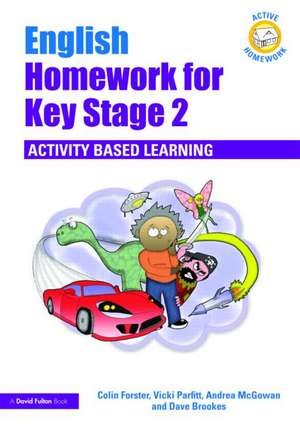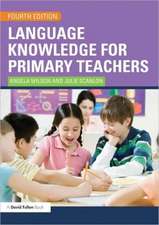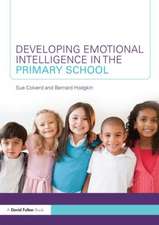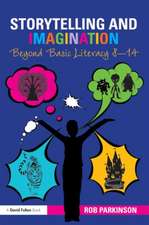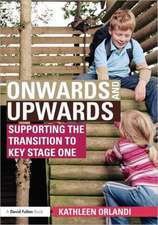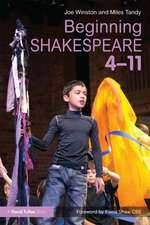English Homework for Key Stage 2: Activity-Based Learning: Active Homework
Autor Andrea McGowan Ilustrat de David Brookes Autor Vicki Parfitt, Colin Forsteren Limba Engleză Paperback – 24 sep 2009
Each activity is quick and easy for pupils and teachers to manage, and includes:
- a learning aim, full, clear instructions and discussion points
- tasks to foster collaboration and partnership between pupils, parents and teachers
- photocopiable resources.
| Toate formatele și edițiile | Preț | Express |
|---|---|---|
| Paperback (1) | 341.86 lei 6-8 săpt. | |
| Taylor & Francis – 24 sep 2009 | 341.86 lei 6-8 săpt. | |
| Hardback (1) | 764.20 lei 6-8 săpt. | |
| Taylor & Francis – 27 sep 2018 | 764.20 lei 6-8 săpt. |
Preț: 341.86 lei
Nou
Puncte Express: 513
Preț estimativ în valută:
65.44€ • 71.10$ • 55.00£
65.44€ • 71.10$ • 55.00£
Carte tipărită la comandă
Livrare economică 22 aprilie-06 mai
Preluare comenzi: 021 569.72.76
Specificații
ISBN-13: 9780415474559
ISBN-10: 0415474558
Pagini: 94
Ilustrații: 51 b/w images and 2 tables
Dimensiuni: 210 x 297 x 5 mm
Greutate: 0.27 kg
Ediția:New.
Editura: Taylor & Francis
Colecția Routledge
Seria Active Homework
Locul publicării:Oxford, United Kingdom
ISBN-10: 0415474558
Pagini: 94
Ilustrații: 51 b/w images and 2 tables
Dimensiuni: 210 x 297 x 5 mm
Greutate: 0.27 kg
Ediția:New.
Editura: Taylor & Francis
Colecția Routledge
Seria Active Homework
Locul publicării:Oxford, United Kingdom
Public țintă
Parents and Professional Practice & DevelopmentCuprins
Guidance for the teacher Speaking, Listening and Interacting: Years Three and Four Speaking, Listening and Interacting: Years Five and Six Drama, Performance and Presentation: Years Three and Four Drama, Performance and Presentation: Years Five and Six Reading and Responding: Years Three and Four Reading and Responding: Years Five and Six Spelling, Punctuation and Structure: Years Three and Four Spelling, Punctuation and Structure: Years Five and Six
Notă biografică
Andrea McGowan is an experienced primary school teacher and a member of the primary English team at the University of Gloucestershire.
Colin Forster is the primary science team co-ordinator and primary PGCE course leader at the University of Gloucestershire.
Vicki Parfitt is an experienced primary school teacher and a member of the primary science team at the University of Gloucestershire.
David Brookes is an illustrator and is a member of the faculty of Natural and Social Sciences at the University of Gloucestershire.
Colin Forster is the primary science team co-ordinator and primary PGCE course leader at the University of Gloucestershire.
Vicki Parfitt is an experienced primary school teacher and a member of the primary science team at the University of Gloucestershire.
David Brookes is an illustrator and is a member of the faculty of Natural and Social Sciences at the University of Gloucestershire.
Recenzii
Reviews
Marcelo Staricoff, primary teacher and deputy headteacher
I am convinced that there is a very big market out there for interesting ways to approach homework and if approached creatively, as this series of books and mine do, then the benefits to children, families and schools can be huge. This proposal comes at a very good time as the issue of homework seems to have entered the national arena. There has been a lot of interest in the pros and cons of homework for primary schools but I think that hardly any school would say that they don’t set any. It is a definite practice with all schools and particularly with KS2. I think this series would be very helpful to teachers of younger children who may not think of giving homework because it involves ‘writing’. I think that the way the series is presented it is absolutely ideal for the younger children to get a feel for homework in a fun, non-pressurised way, with the help of adults and especially as it is based on practical activities. I firmly believe that the rationale for this book is absolutely spot on. Teachers are dissatisfied with current arrangements and regard homework as an extra problem in their lives which they have to set but find it hard to engage with process in a positive manner. The wish to make it fun and to involve the parents are two crucial factors in favour of this series. I believe that involving parents/carers and promoting discussion of learning at home is the future for primary education and from personal experience I know that the benefits are immense! The wonderful thing about the rationale of this series is that the children will not be seeing it as a chore but as playful learning.
Anna Archer, primary teacher (UK, New Zealand, US)
I definitely think there is a market for this type of series. Once schools, students and parents consider the benefit of this type of homework as opposed to the traditional worksheet format I think they will support it 100%. Most of the homework activity books I have come across are worksheet based and require students to fill in a space, colour sections in or draw a picture. I think the idea is fantastic and the example sheets are great. The aims are simple for anyone to help with and use materials lying around at home. The questions for thinking about and discussing are clear and open-ended, which encourages the students to think beyond yes or no, but more in-depth. I definitely think there is a market for these types of books especially for the frazzled teacher.
From reading through the proposal and sample examples I think these books are stronger than the ones on the market. The objectives/aims tie in with the QCA and NSL Framework. These books encourage the students to think for themselves while doing and becoming independent learners. However, each school would need to make a commitment to make it a school-wide policy and on parent-teacher nights to introduce this to the parents, so they understand fully, as they have a bigger role to play.
I have taught in many different settings and countries around the world and in all the settings teachers gave homework, however varied it was. This series would be helpful for the teacher who already gives homework as a way to spark new practical ideas while supporting schemes of work as well as encouraging the teacher who doesn’t commonly give homework. My experience of giving homework has been hands on kinesthetic activities, similar to the examples in this proposal I like to incorporate using the multiple intelligences in the homework too because this encourages the students to use their brain in more ways than one.
John Taylor, distance learning development officer and David Fulton author
[There is a market for this series,] particularly in schools with literate, co-operative parents, and those schools which follow the QCA schemes. The beauty of the proposal is the linking in with QCA. Schools can integrate homework tasks into their planning.
This is an excellent idea, particularly if the activity is in preparation for the next day’s lesson and that carers and children are aware that the activity will enhance what they are to learn rather than simply being an add-on to what they’ve done in school. Science particularly lends itself to this hands-on approach as does Maths to some degree. There is a lot to be gained by having the children primed before a piece of classwork is introduced.
Designing a range of varied pen-less activities for literacy may be a challenge. There’s probably a limit to how many "talk to …… about …" tasks a parent can take; especially if they have more than 1 KS 2 child.
This approach really needs to be introduced properly to parents as a school policy. It needs parents to understand that they can help their child(ren)’s learning, that these activities really do contribute, and that it is all right for children to "enjoy" homework!
Marcelo Staricoff, primary teacher and deputy headteacher
I am convinced that there is a very big market out there for interesting ways to approach homework and if approached creatively, as this series of books and mine do, then the benefits to children, families and schools can be huge. This proposal comes at a very good time as the issue of homework seems to have entered the national arena. There has been a lot of interest in the pros and cons of homework for primary schools but I think that hardly any school would say that they don’t set any. It is a definite practice with all schools and particularly with KS2. I think this series would be very helpful to teachers of younger children who may not think of giving homework because it involves ‘writing’. I think that the way the series is presented it is absolutely ideal for the younger children to get a feel for homework in a fun, non-pressurised way, with the help of adults and especially as it is based on practical activities. I firmly believe that the rationale for this book is absolutely spot on. Teachers are dissatisfied with current arrangements and regard homework as an extra problem in their lives which they have to set but find it hard to engage with process in a positive manner. The wish to make it fun and to involve the parents are two crucial factors in favour of this series. I believe that involving parents/carers and promoting discussion of learning at home is the future for primary education and from personal experience I know that the benefits are immense! The wonderful thing about the rationale of this series is that the children will not be seeing it as a chore but as playful learning.
Anna Archer, primary teacher (UK, New Zealand, US)
I definitely think there is a market for this type of series. Once schools, students and parents consider the benefit of this type of homework as opposed to the traditional worksheet format I think they will support it 100%. Most of the homework activity books I have come across are worksheet based and require students to fill in a space, colour sections in or draw a picture. I think the idea is fantastic and the example sheets are great. The aims are simple for anyone to help with and use materials lying around at home. The questions for thinking about and discussing are clear and open-ended, which encourages the students to think beyond yes or no, but more in-depth. I definitely think there is a market for these types of books especially for the frazzled teacher.
From reading through the proposal and sample examples I think these books are stronger than the ones on the market. The objectives/aims tie in with the QCA and NSL Framework. These books encourage the students to think for themselves while doing and becoming independent learners. However, each school would need to make a commitment to make it a school-wide policy and on parent-teacher nights to introduce this to the parents, so they understand fully, as they have a bigger role to play.
I have taught in many different settings and countries around the world and in all the settings teachers gave homework, however varied it was. This series would be helpful for the teacher who already gives homework as a way to spark new practical ideas while supporting schemes of work as well as encouraging the teacher who doesn’t commonly give homework. My experience of giving homework has been hands on kinesthetic activities, similar to the examples in this proposal I like to incorporate using the multiple intelligences in the homework too because this encourages the students to use their brain in more ways than one.
John Taylor, distance learning development officer and David Fulton author
[There is a market for this series,] particularly in schools with literate, co-operative parents, and those schools which follow the QCA schemes. The beauty of the proposal is the linking in with QCA. Schools can integrate homework tasks into their planning.
This is an excellent idea, particularly if the activity is in preparation for the next day’s lesson and that carers and children are aware that the activity will enhance what they are to learn rather than simply being an add-on to what they’ve done in school. Science particularly lends itself to this hands-on approach as does Maths to some degree. There is a lot to be gained by having the children primed before a piece of classwork is introduced.
Designing a range of varied pen-less activities for literacy may be a challenge. There’s probably a limit to how many "talk to …… about …" tasks a parent can take; especially if they have more than 1 KS 2 child.
This approach really needs to be introduced properly to parents as a school policy. It needs parents to understand that they can help their child(ren)’s learning, that these activities really do contribute, and that it is all right for children to "enjoy" homework!
Descriere
English Homework for Key Stage 2 is a suite of activities, aligned to the national curriculum subject and topic areas, that children can do – and discuss – at home.
